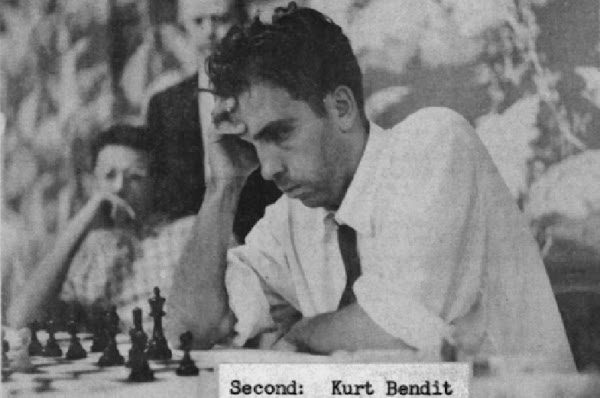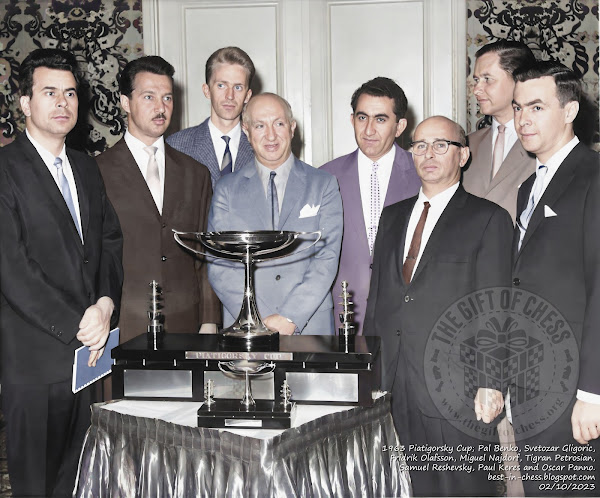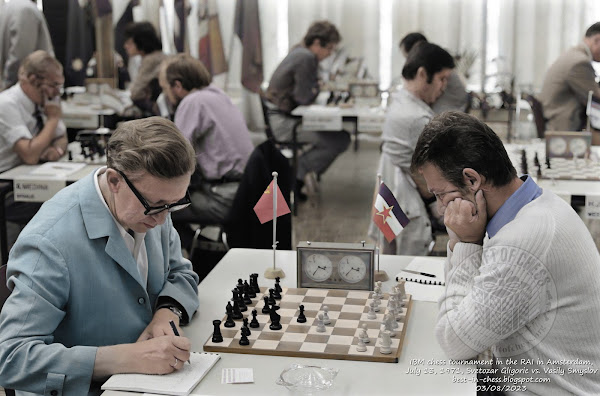Back to Home Index
February 07 1903
Boston Evening Transcript, Boston, Massachusetts, Saturday, February 07, 1903
Lasker vs. Barry Today
In Simultaneous Play at the Boston Chess Club, Last Night, the Champion Won Twelve, Drew Two and Lost Two Games
This afternoon and evening at the Boston Chess Club John F. Barry, Boston's leading chess amateur, will meet Dr. Lasker for the second time. The world's champion, who is entitled by courtesy to the move and with it the first player's privilege to dictate the opening to a certain extent, has generously expressed himself as entirely willing to play the black men again. If Mr. Barry plays the white there will be great interest among his followers to note the particular variation which he will select on his fifth move, it being taken for granted that the opening will be a Ruy Lopez, with the first four moves identical with those of the first game between the two experts.
Last evening at the Chess Club Dr. Lasker met a team of sixteen men in simultaneous play. Twelve of these he defeated, to two he lost, and with two he drew. The winners were Mr. A. W. Ryder, the old Harvard player, now instructor in Sanskrit at the Cambridge university, and J. S. Jones, a Denver lawyer, formerly of this city, and for some weeks a visitor here. Draws were scored by Claude T. Rice of Harvard, at present the leading university player, and by Harlow B. Daly, captain of the Dorchester Chess Club team, a schoolboy player who is considered one of the most promising of the rising chess generation.
Mr. Ryder won the exchange in the mid-game through Dr. Lasker's tactical error allowing him to “fork” the two white rooks with his knight. With this gain in material he steadily forced an increasingly advantageous position, and Dr. Lasker resigned after thirty-four moves. Mr. Jones, like Mr. Ryder, defended a Ruy Lopez. He found a flaw in Lasker's attack, and took advantage of it with such accuracy that on the thirty-eighth move white resigned with the loss of a piece and the queening of an adverse pawn in sight.
Mr. Rice, who lost to Lasker at the B. A. A. Wednesday, played a center counter Gambit, and got an attack early in the game. He pressed it steadily, but Dr. Lasker defended so skillfully that only a draw resulted. Mr. Daly's game was the sharpest fought of the match. It was a King's Gambit Declined, an opening which gives black an even game if properly met, and Mr. Daly played it finely. Early in the evening he refused a proffered draw, and his refusal was renewed at a later stage in a more even position. Finally it came down to an ending with three pawns on a side and an even position. The champion's third offer of a draw was then accepted.
Among those who lost were Mr. Lourie, who won his game against Lasker Wednesday, but who was unable to repeat the feat, though he played a strong game. Technically Lyman F. George drew, Dr. Lasker accepting his facetious offer of a draw in a lost position with the smiling answer, “You've worked hard for it; take it.” Others less fortunate were W. J. Miller, F. E. Parker, S. M. Ballou, J. Crane, Jr., J. J. Kraus, G. R. MacNamara, G. E. Hyde, H. Friberg, Dr. D. B. Lepper and Dr. Percival.
February 08 1903
The Boston Globe, Boston, Massachusetts, Sunday, February 08, 1903
Boston Chess Experts vs. Dr Lasker.
Sketches of the Men Who Have Defeated or Held the World's Champion.
Boston Chess Experts Who Played Against Champion Lasker.
The visit of Dr. Emanuel Lasker, which began Monday afternoon at the Boston athletic association, conclude last evening at the Boston chess club. His work was watched with interest in this city contested with the master, and the two local stars, John F. Barry, the world's amateur champion, and Abraham Moses Sussman, New England champion, went down to defeat before him.
During his visit Dr. Lasker was defeated three times in simultaneous play and five local men registered draws in their matches.
W. R. Lourie of the Boston chess club, who scored the first victory over the noted master at the Boston athletic association on Wednesday evening, was born in Russia in 1883. He came to this country when quite young with his parents, and was educated at the English high school. He was graduated with honors in 1901, and returned to take a post-graduate course. He entered the Institute of Technology last September.
About five years ago he first took up chess, but did not enter into the deeper study of the game until two years ago, when he joined the Boston chess club. His victory over Dr. Lasker was a revelation to the members of the organization, who anticipate a brilliant career for the young man in future tournaments.
At the rooms of the Boston chess club on Friday evening A. W. Ryder and L. S. Jones succeeded in forcing Dr. Lasker to resign. Ryder accomplished his feat on the 34th move, while Jones required 38 to beat the champion. Ryder, who is an old Harvard player, is now an instructor in the university from which he received his degree. He has played the game for several years and has often contested with experts of note in local tournaments.
Jones hails from New York where he is identified with the Manhattan chess club. He is also a member of the Boston chess club and has often competed in the big tournaments. He has battled against amateur champion John F. Barry on more than one occasion, but the latter has inevitably come out victorious.
The men who have broken even with Dr. Lasker during his visit of the past week are Bertram A. Smalley of the Boston Press club, Herbert H. White of the Boston A. A., Frank K. Foster and Harlow B. Daly of the Dorchester Chess club and Claude T. Rice of the Harvard Chess club.
Smally has been one of the most prominent members of the Press club's chess team for several years. He is a graduate of Dartmouth college, where he took a prominent part in track athletics and football.
White is a graduate of Harvard and a chess player of note. He was a member of the varsity chess team during his collegiate course and upon graduation was appointed manager of athletics.
Frank K. Foster is well known in this city, especially in labor circles, where he has held several high elective positions. He is a regular player on the Dorchester chess club team and last May was associated with the Boston chess team which played the Brooklyn chess club on Memorial day.
Harlow B. Daly, secretary of the Dorchester chess club is 19 and a student at the Boston Latin school. He resides with his parents on Butler st., Dorchester Lower Mills. He has been a moving spirit in the Dorchester club, and has attained considerable prominence as a player. He was also associated with the Boston team which played Brooklyn chess club last year.
Claude T. Rice, the Harvard expert, met Dr. Lasker at the B. A. A. Wednesday evening and was defeated, being the first to resign. His draw with the expert Friday evening was not unexpected, as he is considered a clever player, and especially so in intercollegiate circles. He is a member of the American university team which plays the Oxford-Cambridge team by cable in April.























































